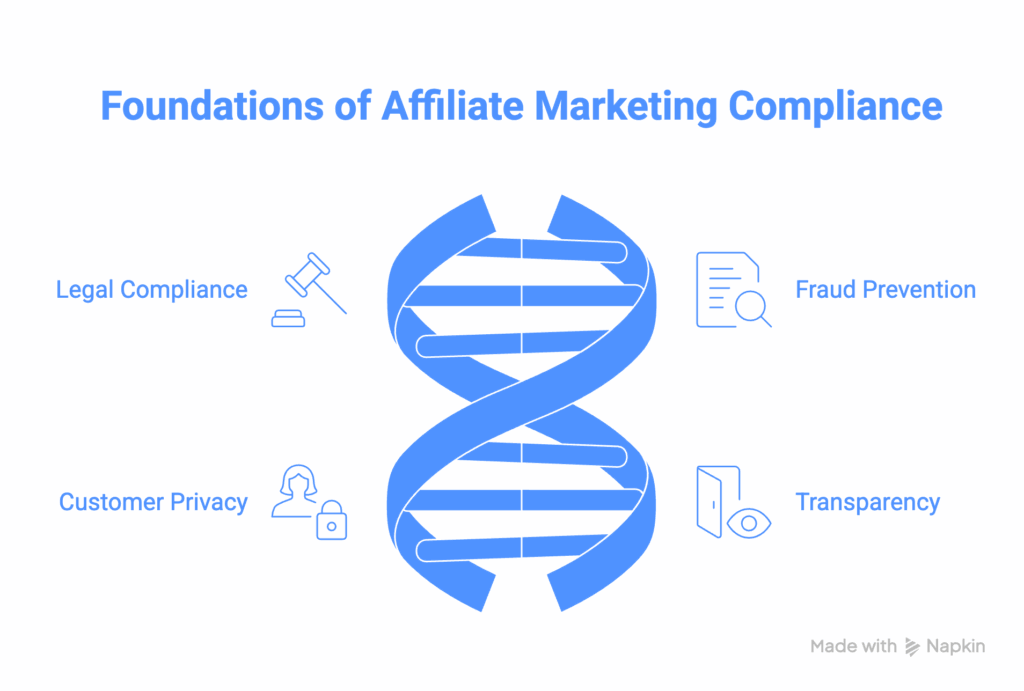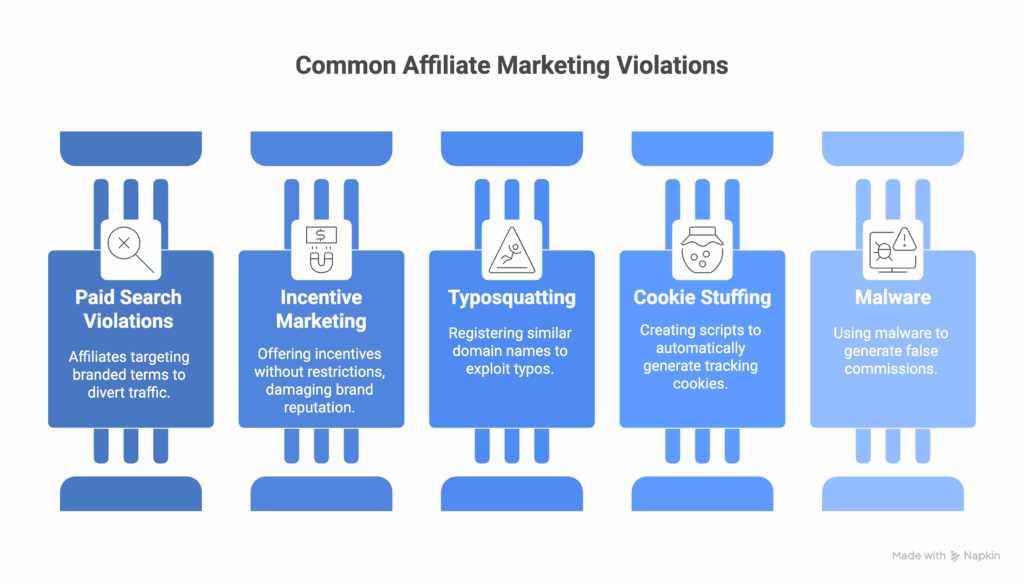Many businesses launching their affiliate programs find themselves struggling to ensure affiliate partners stay compliant with all the terms of their affiliate agreement.
This is often because of a lack of proper compliance structure, which can create a range of problems for your business, including financial loss.
Ensuring affiliate contract compliance is a vital process for businesses that rely on affiliate systems; hence, we’ve written this article to better guide you. We’ll discuss the risks associated with faulty compliance practices and what you can do to ensure your partners follow the agreed affiliate rules.
Table of Contents
Why Is Affiliate Marketing Compliance Important?

Keeping Up with Relevant Laws and Regulations
Affiliate marketing activities are subject to local and international laws and regulations governing advertising, data privacy, and consumer protection. If your affiliates fail to follow these guidelines while promoting your brand, you may be considered responsible and face fines or other sanctions.
Your affiliate partnership policy should accurately reflect legal guidelines in your company’s home jurisdiction, as well as those applying to your affiliates and markets you wish to target.
Some of the most important international regulations to stay aware of when creating and enforcing your affiliate terms to ensure affiliate contract compliance include:
- For the USA: Federal Trade Commission (FTC) Guidelines, California Consumer Privacy Act (CCPA), and the California Privacy Rights Act (CPRA).
- For the EU: General Data Protection Regulation (GDPR).
- For the UK: Advertising Standards Authority (ASA) CAP Code.
- For Australia: Australian Consumer Law (ACL).
Preventing Fraud
Your affiliates may use fraudulent methods, such as brand impersonation or using fake clicks to earn extra commissions, to unethically earn money either at your expense or the expense of your clients. Effective contract compliance efforts can greatly reduce the chance of this happening.
Ensuring Customer Privacy
Implementing and consistently applying policies designed to protect customer data and prevent its abuse not only helps you comply with privacy laws but also safeguards your brand’s reputation.
Upholding Affiliate Transparency
Transparency towards customers, such as clearly disclosing the nature of the affiliate relationship with your brand and providing entirely truthful information about promoted products and services, is required by many international regulations. Apart from that, staying honest and transparent on all marketing levels improves your brand trust.
What Are the Most Common Affiliate Marketing Agreement Violations to Stay Mindful of?

Most affiliate programs explicitly prohibit certain behaviors that affiliate marketers may use to gain an unfair advantage at others’ expense. These include:
- Paid search policy violations: Some affiliates may intentionally target their partner company’s branded terms to divert traffic and gain more clicks and visitors.
- Incentive marketing: This refers to marketing practices of offering incentives to take certain actions; while this may be a very effective marketing tactic, letting affiliates use it with no restriction may damage your brand’s reputation.
- Typosquatting: Unethical affiliates may register domain names that are almost identical to their partner brand’s, usually with a common typo—the idea is to take advantage of people typing the wrong URL by placing tracking cookies before redirecting them to the correct site, enabling affiliates to claim extra referrals.
- Cookie stuffing and forced clicks: A common unethical tactic for affiliates is to create scripts on their websites that may either automatically create tracking cookies or load affiliate links, claiming undeserved credit for referrals.
- Malware: Some affiliates may outright use malware to install programs that generate false commissions, compromising user privacy and security in the process.
What Are some of the Best Tactics for Monitoring Affiliate Contract Compliance?
1. Build a Strong, Comprehensive Affiliate Policy
You should define the exact terms and conditions of your affiliate program in a clear, transparent manner that’s laid out in plain language, leaving no room for ambiguity. Don’t worry about coming off too verbose—you should aim to cover all bases and define guidelines for any relevant situations that affiliates may find themselves in.
As such, it’s also worth providing concrete examples of the way affiliates should act in specific situations, such as the proper way they should formulate disclosures.
Also, it’s best to clearly define non-compliance rules and set consequences for all possible violations, letting affiliates know that compliance breaches may result in reduced commissions, suspensions, or full terminations.
2. Create an Affiliate Training Program
Many potential affiliates with no prior experience may find navigating compliance rules too difficult to handle, and they may cause breaches out of ignorance or negligence rather than malicious intent. To avoid this, it’s best to provide them with a compliance guide and other learning resources.
Implementing a training program that includes a resource library, as well as additional elements such as webinars or a communication channel for knowledge sharing, will help your affiliates learn how to ensure compliance, as well as introduce them to your brand culture and voice.
To improve the overall compliance level, you also have the option of making affiliate training a mandatory step of the onboarding process.
3. Conduct Regular Affiliate Audits
Regular affiliate audits are necessary to monitor your affiliates’ performance, but also track their content and disclosures, to ensure that they are followed and up-to-date, allowing you to immediately notify the affiliate in case of any compliance breaches.
In addition to automated auditing and monitoring tools, it’s a good idea to hold manual audits each quarter, to ensure nothing problematic might’ve slipped past the system.
4. Ensure Accurate Affiliate Disclosures
Accurate disclosures are one of the crucial parts of an effective compliance policy—they must clearly and explicitly inform audiences about the affiliate’s relationship with your brand and reveal any other information concerning customers.
To ensure accuracy and make the job easier for affiliates, the best option is to provide pre-approved disclosure templates that they can just copy and paste.
5. Use Fraud Detection and Compliance Monitoring Tools
Monitoring affiliate contract compliance is difficult—if not outright impossible—without the right tools to help you enforce rules and stay on top of everything, especially when your program scales up to a certain scale. Knowing which tools to use and how to get the most out of them makes a world of difference in terms of convenience and effectiveness.
Most affiliate management platforms oriented towards general use, such as UpPromote, offer monitoring tools that help you manage your affiliates and keep track of their performance, and sometimes include rudimentary compliance-oriented features.
Try UpPromote with 20% discount
Still, for the most comprehensive compliance monitoring, it’s advised to also use specialized tools for monitoring brand compliance and detecting any possible fraud attempts, such as BrandVerity or one of the possible alternatives.
Get Our Help with Building Your Affiliate Program!
Ensuring compliance in affiliate marketing can be quite challenging, especially if you’re new to managing an affiliate marketing program and trying to build the whole system from scratch.
Affiliate compliance is tricky, yet a very necessary part of affiliate marketing, which is why outsourcing such duties to a trusted third-party agency can always save you some headaches.
At Vivian Agency, we’ve helped several businesses like yours handle their affiliate systems, from inception to results.
Want a success story of your own? Contact us immediately and tell us what you need, and we’ll get right back to you.
If you’d prefer a direct talk straight away, we can also schedule a personal online meeting!





